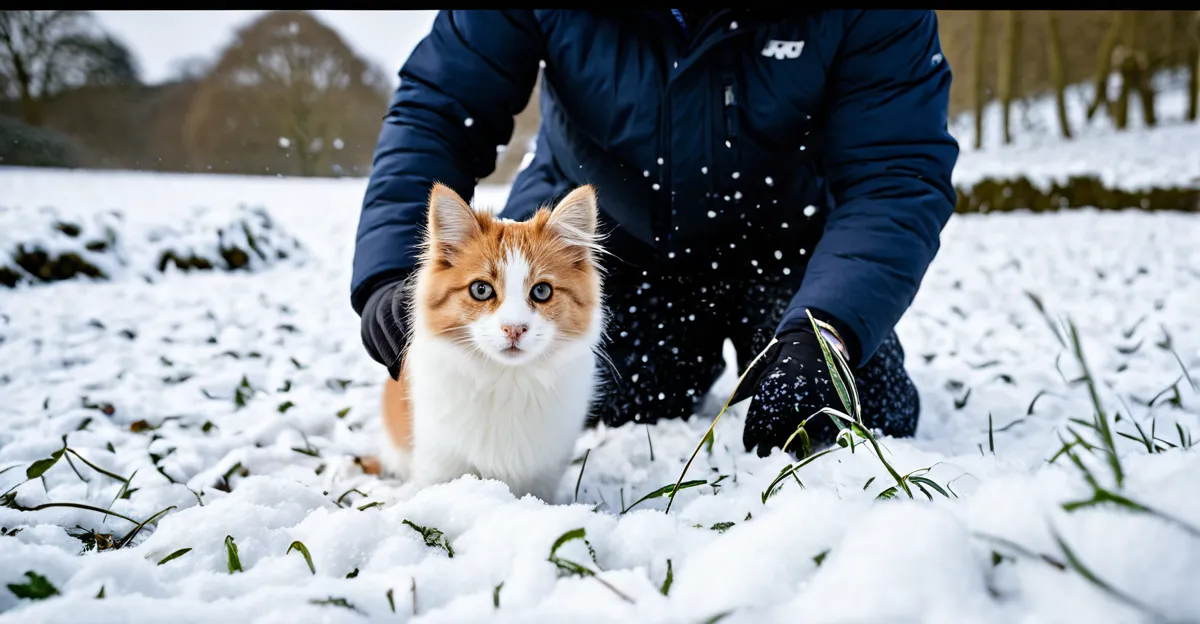Winter Pet Care Essentials
As the colder months roll in, UK pet owners must prioritize adapting their pets’ routines and diets to ensure winter safety. A significant component of winter pet care is adjusting pets’ diets for optimal winter health. Pets often require more energy to stay warm, so it’s crucial to tailor their nutritional intake accordingly. Consulting with a vet can help you determine the right balance for your pet’s size and breed.
Equally vital is maintaining critical exercise routines to ensure pets remain fit and healthy during winter. For dogs, aim for regular walks, but adjust the duration and intensity depending on the weather. Indoors, you can create engaging exercise routines using toys or setting up simple obstacle courses to keep them active and stimulated.
Also read : How do UK laws impact pet ownership responsibilities?
In addition to diet and exercise, grooming considerations are necessary to protect pets from winter elements. Regular grooming, including brushing and checking for salt or ice clumps, helps maintain a healthy coat. Pay special attention to paws, which can be sensitive to cold and salt, and apply a pet-safe balm if needed. Adapting these essential routines will contribute to your pets’ comfort and health during the winter months.
Cold Weather Precautions
Ensuring cold weather pet safety involves taking specific measures to protect your pets from winter hazards, especially considering the unique challenges posed by UK climates. During winter, pets can face a variety of risks, including exposure to extreme cold and potential contact with harmful substances like antifreeze.
This might interest you : What Are the Latest UK Pet Technology Innovations?
Outdoor Safety Measures
When venturing outside, it is crucial to be mindful of the winter hazards. Ensure pets wear appropriate gear, such as jackets or booties, to protect against the cold and potential irritants like salt or ice-melting chemicals. Limit their exposure to cold winds, and if the temperature drops too low, keep walks short and supervised.
Signs of Hypothermia in Pets
Recognizing the signs of hypothermia can prevent serious health issues. Symptoms include shivering, lethargy, and weakness. In severe cases, pets may exhibit difficulty breathing or incoherent behaviour. If you suspect hypothermia, it is vital to seek veterinary care immediately and gradually warm your pet indoors.
Safeguarding Against Ice and Snow
Particular attention is needed when walking pets in frost. Precautions for outdoor walks include checking for hidden ice patches that can be slippery or injurious. Additionally, ensure pathways and patios are de-iced using pet-safe products, as certain de-icing chemicals can be toxic if ingested. Regularly inspect and clean pets’ paws to remove any ice clumps, salt, or chemicals accumulated during outdoor activities. These practices will help maintain a safe environment and prevent potential injuries during winter months.
Indoor Activities for Pets
When the chill of winter keeps outdoor play to a minimum, indoor pet activities become vital for your pet’s well-being. Keeping pets active and mentally stimulated ensures they remain healthy and happy throughout the colder months.
Engaging games and toys are perfect for infusing winter play into your pet’s daily routine. Consider interactive toys that challenge your pet’s intelligence and curiosity. Puzzle toys that dispense treats can provide hours of fun and learning, keeping pets both entertained and engaged.
To provide mental stimulation, create different environments using everyday objects. For instance, set up an obstacle course using household items to keep your pet physically active and mentally sharp. This not only nurtures their instincts but also offers a playful challenge.
Creating a safe and fun indoor environment is crucial. Ensure toys and activities are appropriate for your pet’s size and energy levels. Regularly inspect toys for any wear and tear, as safety is paramount during playtime. By incorporating these ideas, you can maintain an engaging and stimulating atmosphere, promoting physical and mental wellness for your pets during winter.
Health Monitoring during Winter
Winter pet health is a crucial aspect of pet care, requiring vigilant monitoring for any changes in behaviour or health. Pets can be more vulnerable to illnesses in colder months, making regular wellness checks imperative. Adjustments in their routines might lead to changes in appetite or activity levels; stay alert to such signs to ensure your pet’s well-being.
Scheduling winter veterinary check-ups is essential, as your vet can provide personalized advice on maintaining your pet’s health during this period. Regular visits help identify potential health concerns early, preventing complications. This is also an ideal time to discuss any dietary adjustments necessary to suit the seasonal demands.
Additionally, ensure your pet is up-to-date on vaccinations and protected against parasites. Winter does not halt parasite activity, and your vet can recommend prevention strategies, including safe and effective treatments. By maintaining a strong preventative health routine, you safeguard your pet against common winter health issues.
Local Resources for Pet Owners
Connecting with UK pet resources is essential for effective pet care, especially in winter. Knowing where to find reliable assistance and information can enhance your efforts in keeping your pet healthy and happy.
Finding Local Veterinarians
Identifying trustworthy veterinarians in your area is pivotal. Local vets can provide tailored advice on winter pet care, ensuring your pet’s health and well-being. Seek recommendations from fellow pet owners or utilize online directories to find reputable veterinarians with expertise in cold weather conditions and seasonal health adjustments.
Pet Care Workshops and Events
Engaging in educational programs can greatly enhance your knowledge in winter pet care. Check for local pet care workshops and events, which often cover essential topics like diet adjustments, exercise routines, and grooming for winter climate. These programs allow UK pet owners to learn practical skills and connect with community experts who can offer personalised tips and guidance.
Online Forums and Support Groups
Digital platforms can be invaluable for community support. Join online forums and support groups where you can engage with other pet owners facing similar winter challenges. Sharing experiences and learning from others can provide new insights and enhance your approach to winter pet care. These networks can also alert you to local services, upcoming events, and resource availability, building a strong support system throughout the winter months.










